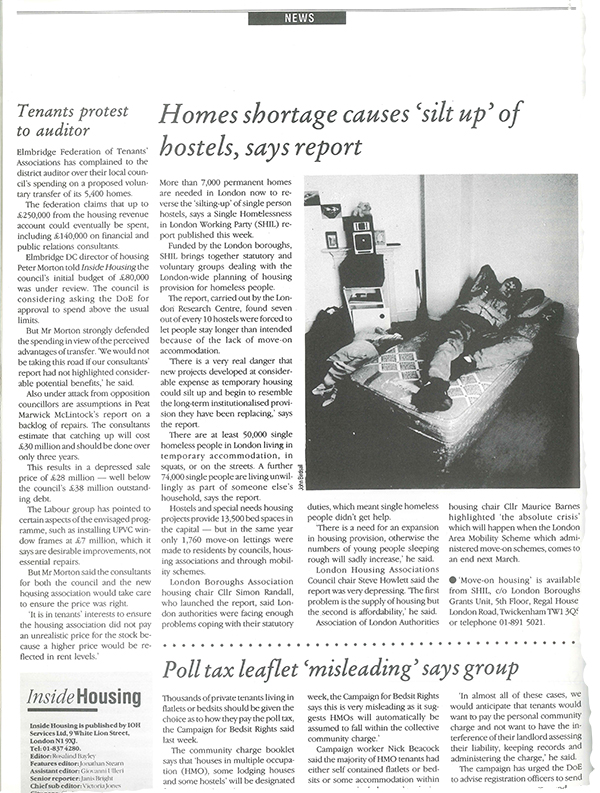You are viewing 1 of your 1 free articles
From the archive – Housing Corporation fails to spot landlord’s financial trouble
Inside Housing looks back at what was happening in the sector this week 10, 20 and 30 years ago
30 years ago
A report revealed that more than 7,000 permanent homes were needed in London to reverse the ‘silting-up’ of single-person hostels, as people found themselves trapped in temporary accommodation.
The report, carried out by the London Research Centre, found that seven out of every 10 hostels were forced to let people stay longer than intended because of the lack of move-on accommodation.
“There is a very real danger that new projects developed at considerable expense as temporary housing could silt up and begin to resemble the long-term institutionalised provision they have been replacing,” the report warned.
There were at least 50,000 single homeless people in London living in temporary accommodation, in squats or on the streets at the time.
20 years ago
A Bristol housing association was placed under supervision by the Housing Corporation after running into financial problems.
Bristol Churches Housing Association (BCHA), which owned and managed 2,500 homes in the area, made errors in counting certain repairs and development spending, which were expected to lead to large losses at the end of the financial year.
The Housing Corporation said it had “serious concerns” about the landlord but did not suspect fraud. Chief executive Paula Fance said the association expected to cut jobs.
In a twist, the corporation had recently granted BCHA a six-fold increase in its start-of-year allocation in anticipation of an upturn in its development programme, handing it more than £2.66m in the 1999/2000 financial year, up from £434,000 a year previously.
The quango’s controls had failed to detect the looming crisis, South West regional director Andrew Wiles admitted. He said the body would “be looking closely at our systems”.
He said BCHA’s problems had arisen as a result of a “unique combination of circumstances”.
Picture: Solent News
10 years ago
Peter Marsh (above), former chief executive of the Tenant Services Authority (TSA), set out his plan to tackle regulation, which included controversial proposals to introduce less secure tenancies in areas of high demand.
The TSA had embarked on a tour of England to canvass the views of thousands of tenants and landlords, before publishing a new 14-point framework against which landlords would be judged.
Mr Marsh revealed that the TSA was considering drawing up a code of practice, setting out when different types of tenancies could be used. It also promised to set a standard for rent levels, and suggested limiting mergers to associations that could prove they were good at engaging tenants.










